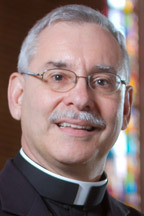
Bishop Anthony B. Taylor delivered this homily May 5.
Today’s Gospel comes from Jesus’ Farewell Discourse, which took place during the Last Supper in the Gospel of John.
After Jesus washed his disciples’ feet to emphasize the true nature of service, he then announced Judas’ betrayal and that Peter will deny him — and naturally his disciples found this talk of gloom and doom very troubling. This leads Jesus to reassure them that even though he will be departing, God will not abandon them. Indeed, he will send them the Holy Spirit to be with them and guide them always.
In the portion of this discourse you just heard, Jesus says, “The advocate, the Holy Spirit, whom the Father will send ... will teach you everything and remind you of all that I told you.” Here Jesus says two very important things:
1) The Holy Spirit “will teach you everything.” This reminds us that in matters of faith, we are to be lifelong learners.
Jesus gives us the Holy Spirit to lead us to a deeper and deeper knowledge of God and the truths of religion. Meaning, there is no excuse for a Christian to have a closed mind. If you think you know all you need to know about our faith, you don’t even know much about the Holy Spirit.
2) The Holy Spirit “will remind you of everything that I” — meaning Jesus — “told you.” This means first of all that when we investigate with open minds the things we believe, there is always the danger that we might get it wrong.
The truth of Jesus’ teaching is clear, but when we take the next step and draw conclusions in our own minds about what this means for us, the Holy Spirit will be there to help us test our conclusions in the light of Jesus’ word and thus help us to avoid falling into error. In this case, the error of mistaken belief.
And then there’s also the error of mistaken — that is, sinful — behavior, which is a more immediate concern for most of us. So the Holy Spirit also intervenes to remind us of Jesus’ words when we are tempted to sin and are just about to do it, and then in this moment of danger puts our conscience on high alert. And literally, by the grace of God, pulls us back from the brink of sin.
I’ll bet most of us have experienced this. Especially that flash of warning from the Holy Spirit. And hopefully also the experience of not falling into that sin as a result. Or if not, at least the remorse and grace to seek forgiveness, which are also gifts of the Holy Spirit.
This is why, knowing that his disciples will betray, deny and abandon him, the next thing Jesus speaks about is peace. “Peace I leave with you; my peace I give you. Not as the world gives it do I give it to you. Do not let your hearts be troubled or afraid.”
We typically think of peace as mainly having to do with the absence of conflict, but in the Bible “shalom” (the Hebrew word for “peace”) is a much broader concept having to do with everything that is good for us, including our health. Where we would say, “How are you doing?” a Hebrew speaker says, “How is your shalom?” This influence of Jesus’ Semitic culture is reflected also in the Greek of the New Testament.
So the key thing to notice is that for Jesus, “peace as the world gives it” is a false peace centered merely on the avoidance of trouble — which may even be simple cowardice, the refusal to confront evil.
The true peace that Jesus gives is an interior peace that is independent of outward circumstances. It is the peace not of escapism but rather of conquest, of overcoming evil, resisting evil with the force of good — peace that is at its core, the fruit of self-sacrificing love. It is a peace that costs us a lot personally.
And that is why Jesus then goes on from there to speak in the rest of this discourse about his upcoming struggle with the power of evil — the cost he will pay to set us free from the power of sin and death — culminating in his crucifixion and then his ultimate vindication on Easter Sunday, the peace the world cannot give par excellence.
Please read our Comments Policy before posting.
Article comments powered by Disqus Studio 3:16 offers new approach to teaching religion
Studio 3:16 offers new approach to teaching religion
 After three decades, NLR principal plans to retire
After three decades, NLR principal plans to retire
 CHS athlete overcomes odds to reach collegiate goal
CHS athlete overcomes odds to reach collegiate goal
 John Calipari: UA basketball coach and devout Catholic
John Calipari: UA basketball coach and devout Catholic
 'Cabrini' film tells story of saint with great faith
'Cabrini' film tells story of saint with great faith
 St. Joseph a model of solidarity with immigrants
St. Joseph a model of solidarity with immigrants
 Two gifts after Jesus’ death: Virgin Mary and Eucharist
Two gifts after Jesus’ death: Virgin Mary and Eucharist
 Why we have an altar, and not just a communion table
Why we have an altar, and not just a communion table
 Pope: Wars should be resolved through nonviolence
Pope: Wars should be resolved through nonviolence
 Living relationship with Jesus Christ in the Eucharist
Living relationship with Jesus Christ in the Eucharist